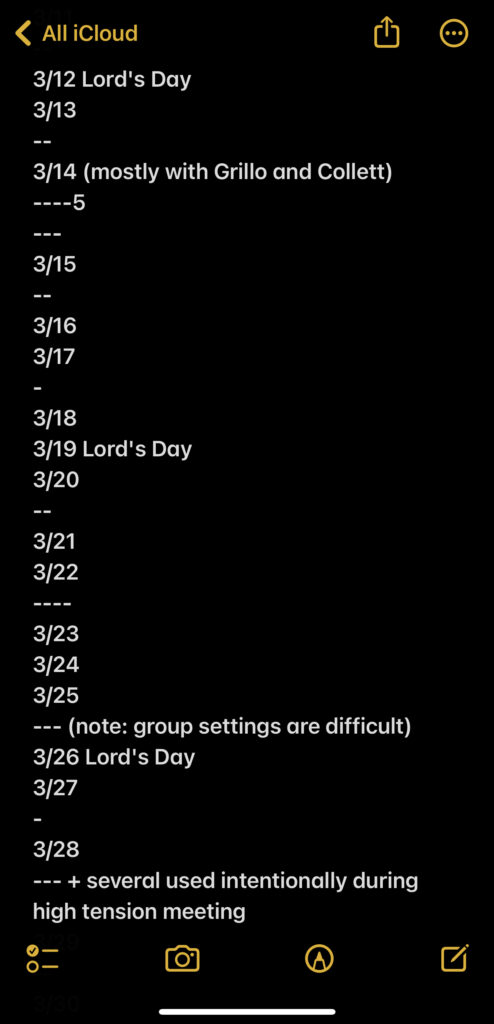
My daughter, my two sons, and my wife don’t think I’m hilarious, but I do. It’s not just me either, a lot of people agree, maybe even my daughter-in-law. Wit is one of my things, specifically the Irish variety with its endearing sarcasm and piercing insights. As Lent approached and I considered where the fruit of fasting might bear a harvest, I decided to give up being funny (at least on purpose) from Ash Wednesday to Easter.
Resisting my life-long humor habit turned out to be no joke. Here’s what I learned about myself and my world.
I once gave up alcohol and decided never to do that again. I never accidentally poured myself a dram of Laphroaig 16. In fact, I never broke the fast. A few years ago, I gave up my nightly scroll through Reddit (for you redditers, I don’t have an account, I’m just a lurker). It’s sad to admit it, but that was harder than it should have been. Still, I never scrolled the Popular page, not even once.
At sixty-one, however, jokes just come out of my mouth. In fact, by the morning of the first day, I realized I needed to track my “fails” and pinned a page on my Notes to keep a record. See the photo below for a snapshot. There’s legend at the end of this post, but here’s the summary—I had 5 days without using any humor. That’s a 0.125 Lenten batting average. Coincidently, that was my little league average, too. I quit when I was eleven.
We all condition our community to expect things from us. We do that intentionally or instinctively, but it’s always happening. So, I shouldn’t have been surprised when folks chuckled when I wasn’t kidding. I taught them to listen to me that way. On the upside, I learned that I’m so funny I’m funny when I’m not being funny.
On the downside, being known for your humor can be a problem. I need to reflect on the impact my humor-habit has on my pastoral care, leadership, and less formal but more intimate relationships. Since my wife will read this, I need to admit she’s been saying that for decades.
Wit has served me well in countless tense or awkward pastoral, leadership, and family situations. Used in a godly way, it can release a person’s anxiety and communicate that they’re in a safe place to be vulnerable. Few things bond people like laughing together. Good wit can bless people. I knew all that before Lent, but like all things human, my wit isn’t always appropriate. That’s not to say it’s off-color. In fact, that’d be an easier fix. Changing behavior is never easy, but at least it’s outward. Changing why we behave is another matter. Like fasting from food, fasting from humor, made me realize what I was really hungering for.
A few of my discoveries follow, but it’s worth noting that I wouldn’t have recognized them without my Lenten Notes page. Pausing after a conversation to mark my progress, or rather lack of it, forced me to think about my words and the self they expressed.
Here are some lessons.
A few weeks in a pattern emerged. I commonly thought of a joke during transitions or at moments that could be awkward, that is for me, not my conversation partner. It occurred to me that I deployed humor as a kind of self-protection.
Less sympathetically, I also noticed that jokes came to mind when I was bored with the topic or the person talking about it. People may or may not be interesting. This post may or may not be interesting, but during Lent I discovered that it’s just as likely that my lack of interest is about me, not the topic and not the other person.
So, my humor has an insecure side, and a prideful side. It also has a mean side. My jokes don’t usually have sharp barbs, but when they do, at least they have the virtue of honesty. However, Lent taught me that I enjoy mocking a thing, without sounding like a mocker. That’s quintessential Irish humor but being Irish doesn’t give you a pass on the Fruit of the Spirit.
Fasting from humor isn’t like fasting from espresso. People ask you to get coffee during Lent. No one asked me to make them laugh. In fact, no one noticed that I hadn’t made them laugh and that was Lent’s biggest lesson.
I’m not joking when I say I’m very funny. I genuinely am. I’m funny at the kitchen table. I’m funny at staff meetings. I’m funny at the coffee shop, the ER, the check-out line at Safeway, the church foyer, on zoom, over the phone. I’ve made TSA folks laugh and not been detained. When people text “lol” to me they actually mean it. So, I hope you can understand why I thought someone might notice after weeks of friendly encounters that I never made them laugh. No one did.
That didn’t hurt. It didn’t even make me feel uncomfortable. In fact, I thought it was funny. Evidently, no one in my world needs me to make them laugh. Humor isn’t a ticket into relationships. It’s not a shield from them. It’s not a means of being in one. It’s a gift and like all gifts the more we know about how they work in us, the better we can use them to serve others.
Screenshot Legend
The screenshot below covers about two weeks of my Lenten journey. My bias was to be too strict rather than too lax. Dashes (-) indicate times I used words with the intent to joke, whether the person laughed or not. The notation “—-5” was a simple way to keep count when I had a bad day. I only had a few of those, thankfully.
Sometimes I purposely broke my fast for what I decided were valid reasons and made a note in the tabulator. For example, I decided not to “humor-fast” when I spoke at a retreat. Wit is a useful tool when you’re talking for 5 hours. I also decided to use low-key humor in a long, tense meeting.
And, sometimes I just didn’t do well. You’ll also notice two names on 3/14. Those are high-school buddies who I reconnected with on a trip to St. Louis. We were high school knuckleheads back in the late seventies. The only thing that’s changed since then is the teenage part. That was my biggest Lenten fail but it was great to catch up.
According to Lenten tradition, I didn’t fast on Sundays. I think my family would agree that I did some of my best work those days. Or maybe not.
